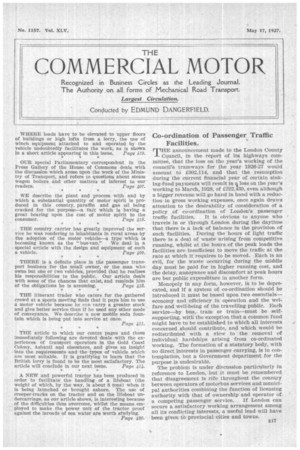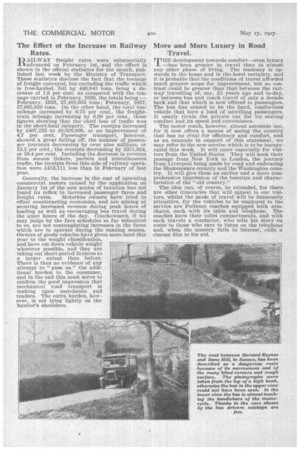Co-ordination of Passenger Traffic Facilities.
Page 35

Page 36

If you've noticed an error in this article please click here to report it so we can fix it.
THE announcement made to the London County Council, in the report of its highways committee, that the loss on the year's working of the council's tramways for the year 1926-27 would amount to £302,114, and that the resumption during the current financial year of certain sinking-fund payments will result in Voss on the year's working to March, 1928, of £222,430, even although a bigger revenue will go hand in hand with a reduction in gross working expenses, once again draws attention to the desirability of consideration of a policy of co-ordination of London's passenger traffic facilities. It is obvious to anyone who ' travels in or through London during the daytime that there is a lack of balance in the provision of such facilities. During the hours of light traffic there is a deal of waste arising from competitive running, whilst at the hours of the peak loads the facilities are insufficient to move the traffic at the rate at which it requires to be moved. Each is an evil, for the waste occurring during the middle day must be paid for in higher running cost, and the delay, annoyance and discomfort at peak hours are but public expenditure in another form.
Monopoly in any form, however, is to be deprecated, and If a system of co-ordination should be introduced it must be based upon two essentials— economy and efficiency in operation and the welfare and well-being of the travelling public. Each service—by bus, tram or train—must be selfsupporting, with the exception that a common fund might have to be established to which all interests concerned should contribute, and which would be redistributed with a view to the removal of individual hardships arising from co-ordinated working. The formation of a statutory body, with no direct interests in passenger carrying, is in contemplation, but a Government department for the purpose is undesirable.
The problem is under discussion particularly in reference to London, but it must be remembered that disagreement is rife throughout the country between operators of motorbus services and municipal authorities combining the function of licensing authority with that of ownership and operator of a competing passenger service. If London can secure a satisfactory working arrangement among all its conflicting interests, a useful lead will have been given to provincial cities and towns. The Effect ot the Increase in Railway Rates.
RAILWAY freight rates were substantially advanced on February 1st, and the effect is shown in the official statistics for the month, published last week by the Ministry of Transport. These statistics disclose the fact that the tonnage of freight conveyed, but excluding the traffic which is free-hauled, fell by 446,845 tons, being a decrease of 1.6 per cent. as compared with the tonnage carried in February, 1926, the totals being :February. 1926, 27,482.665 tons ; February, 1927, 27,035,820 tons. On the other hand, the total tonmileage increased by 0.75 per cent., the freighttrain mileage increasing by 0.30 per cent., these figures showing that the chief loss of traffic was in the short-haul category. The receipts increased by £407,235 to £9,026,808, or an improvement of 4.7 per cent. Passenger transport, however, showed a great falling off, the number of passenger journeys decreasing by over nine millions. or 13.2 per cent., the receipts decreasing by £351,824, or 10.4 per cent. Including the decrease in revenue from season tickets, part.els and miscellaneous traffic, the receipts from this side of railway operation were 1413,111 less than in February of last year.
Generally, the increase in the cost of operating commercial motors caused by the application on January 1st of the new scales of taxation has not found Its reflex in increased passenger fares and freight rates. Motorbus owners have tried to effect counteracting economies, and are aiming at securing increased revenue during peak hours of loading as well as encouraging bus travel during the quiet hours of the day. COachowners, if we may judge by the fare -schedules so far submitted to us, are not contemplating increases in the fares which are to operate during the ensuing season. Owners of goods vehicles have given more heed this year to the weight classification, and have cut down vehicle weight wherever possible, and they are taking out short-period licences to a larger extent than before. There is thus no evidence of any attempt to "pass on" the additional burden to the consumer, and in the end this must serve to confirm the good impression that mechanical road transport is making upon merchants and traders. The extra burden, however, is not lying lightly on the haulier's shoulders.
More and More Luxury in Road Travel.
Fr HE development towards comfort—even luxury —has been greater in travel than in almost any other phase of liVing. The tendency is upwards in the home and in the hotel certainly, and it is probable that the conditions of travel afforded much greater scope for improvement, but no contrast could be greater than that between the railway travelling of, say, 25 years ago and to-day, or between bus and coach travel of only a decade back and that which is now offered to passengers. The bus has ceased to be the hard, comfortless vehicle that bore a load of unwilling passengers. It nearly rivals the private car for its seating comfort and its speed and convenience.
The motor coach, however, almost astounds one, for it now offers a means of seeing the country that has no rival for efficiency and comfort, and as an example in support of this statement, we may refer to the new service which is to be inaugurated this week. It will cater especially for visitors from the United States. They will book their passage from New York to London, the journey from Liverpool being made by road and embracing the Shakespeare country and the Washington country. It will give them an earlier and a more comprehensive impression of the beauties and characteristics of the "old country."
The idea can, of course, be extended, for there are other itineraries that will appeal to our visitors, whilst the mode of travel will be immensely attractive, for the vehicles to be employed in the service are Pullman coaches equipped with armchairs, each with its table and telephone. The coaches have their toilet compartments, and with each travels a conductor, who tells his story en route to those who care to listen on the telephone and, when the scenery fails to interest, calls a cinema film to his aid.




































































































